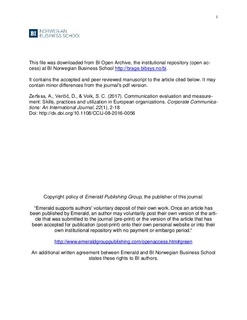| dc.description.abstract | Purpose: The purpose of this paper is to examine the status quo of communication evaluation and measurement practices in communication departments of companies, non-profits, and other organizations across Europe.
Design/methodology/approach: The study argues that the challenge to conduct reliable measurement is threefold: first, communication professionals have to understand and develop skills how to conduct evaluation; second, they have to evaluate whether communication activities have reached those goals in practice; and finally, they have to use those insights to advance and manage their future activities. These aspects are elaborated in the literature review. A quantitative survey of 1,601 professionals from 40 European countries was conducted to research prerequisites, implementation and benefits of communication measurement and compare practices across types of organizations.
Findings: Although robust knowledge of empirical research methods and their application for measuring communication effects is indispensable, many practitioners lack the necessary expertise to conduct reliable evaluation and measurement. Communication departments seldom measure communication effects on stakeholders and organizational goals. Many remain focused on media and channels. Last but not least, organizations do not fully exploit the potential of measurement data for strategically planning future communication activities.
Practical implicatio: The findings highlight the need to reconsider current education and training in communication research methods and their application in corporate practice. Knowledge about conducting applied research is as important as asking meaningful questions and using insights for management decisions in a corporate environment. Evaluation methods are often discussed, but individual skills and the organizational use of insights are important as well. This might be tackled through additional training in social science research techniques, sophisticated valuation methods, and decision making.
Originality/value: The large-scale study shows that communication measurement practices are still in a nascent stage. Joint efforts of academics and professional associations have not really changed the situation until now. The three dimensions used in this research (skills, practices, and utilization) can be used to assess the measurement readiness of individual organizations, to conduct further research in other regions, and to identify future challenges for advancing the field. | nb_NO |
